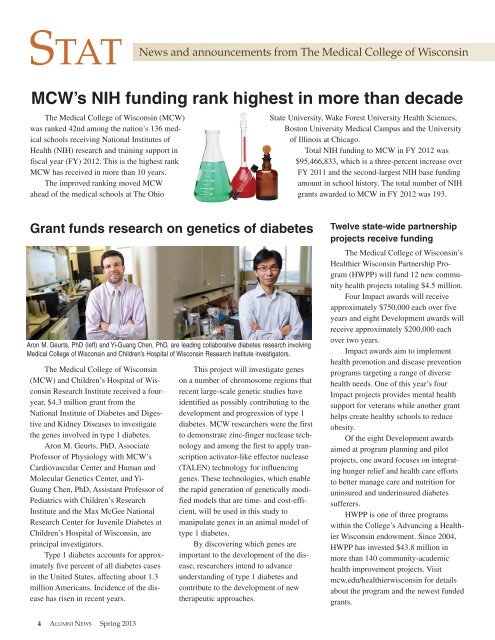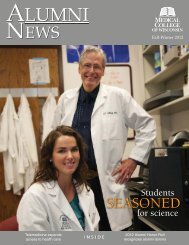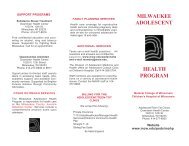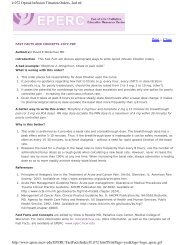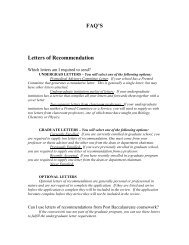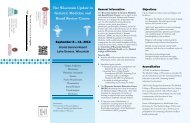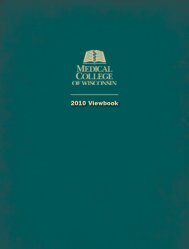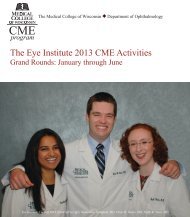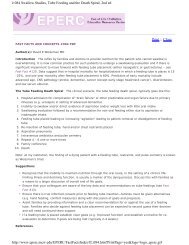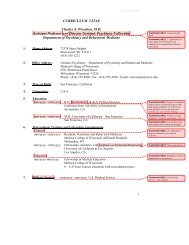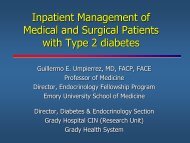Spring 2013 issue (pdf) - Medical College of Wisconsin
Spring 2013 issue (pdf) - Medical College of Wisconsin
Spring 2013 issue (pdf) - Medical College of Wisconsin
You also want an ePaper? Increase the reach of your titles
YUMPU automatically turns print PDFs into web optimized ePapers that Google loves.
STAT<br />
News and announcements from The <strong>Medical</strong> <strong>College</strong> <strong>of</strong> <strong>Wisconsin</strong><br />
MCW’s NIH funding rank highest in more than decade<br />
The <strong>Medical</strong> <strong>College</strong> <strong>of</strong> <strong>Wisconsin</strong> (MCW)<br />
was ranked 42nd among the nation’s 136 medical<br />
schools receiving National Institutes <strong>of</strong><br />
Health (NIH) research and training support in<br />
fiscal year (FY) 2012. This is the highest rank<br />
MCW has received in more than 10 years.<br />
The improved ranking moved MCW<br />
ahead <strong>of</strong> the medical schools at The Ohio<br />
State University, Wake Forest University Health Sciences,<br />
Boston University <strong>Medical</strong> Campus and the University<br />
<strong>of</strong> Illinois at Chicago.<br />
Total NIH funding to MCW in FY 2012 was<br />
$95,466,833, which is a three-percent increase over<br />
FY 2011 and the second-largest NIH base funding<br />
amount in school history. The total number <strong>of</strong> NIH<br />
grants awarded to MCW in FY 2012 was 193.<br />
Grant funds research on genetics <strong>of</strong> diabetes<br />
Aron M. Geurts, PhD (left) and Yi-Guang Chen, PhD, are leading collaborative diabetes research involving<br />
<strong>Medical</strong> <strong>College</strong> <strong>of</strong> <strong>Wisconsin</strong> and Children’s Hospital <strong>of</strong> <strong>Wisconsin</strong> Research Institute investigators.<br />
The <strong>Medical</strong> <strong>College</strong> <strong>of</strong> <strong>Wisconsin</strong><br />
(MCW) and Children’s Hospital <strong>of</strong> <strong>Wisconsin</strong><br />
Research Institute received a fouryear,<br />
$4.3 million grant from the<br />
National Institute <strong>of</strong> Diabetes and Digestive<br />
and Kidney Diseases to investigate<br />
the genes involved in type 1 diabetes.<br />
Aron M. Geurts, PhD, Associate<br />
Pr<strong>of</strong>essor <strong>of</strong> Physiology with MCW’s<br />
Cardiovascular Center and Human and<br />
Molecular Genetics Center, and Yi-<br />
Guang Chen, PhD, Assistant Pr<strong>of</strong>essor <strong>of</strong><br />
Pediatrics with Children’s Research<br />
Institute and the Max McGee National<br />
Research Center for Juvenile Diabetes at<br />
Children’s Hospital <strong>of</strong> <strong>Wisconsin</strong>, are<br />
principal investigators.<br />
Type 1 diabetes accounts for approximately<br />
five percent <strong>of</strong> all diabetes cases<br />
in the United States, affecting about 1.3<br />
million Americans. Incidence <strong>of</strong> the disease<br />
has risen in recent years.<br />
This project will investigate genes<br />
on a number <strong>of</strong> chromosome regions that<br />
recent large-scale genetic studies have<br />
identified as possibly contributing to the<br />
development and progression <strong>of</strong> type 1<br />
diabetes. MCW researchers were the first<br />
to demonstrate zinc-finger nuclease technology<br />
and among the first to apply transcription<br />
activator-like effector nuclease<br />
(TALEN) technology for influencing<br />
genes. These technologies, which enable<br />
the rapid generation <strong>of</strong> genetically modified<br />
models that are time- and cost-efficient,<br />
will be used in this study to<br />
manipulate genes in an animal model <strong>of</strong><br />
type 1 diabetes.<br />
By discovering which genes are<br />
important to the development <strong>of</strong> the disease,<br />
researchers intend to advance<br />
understanding <strong>of</strong> type 1 diabetes and<br />
contribute to the development <strong>of</strong> new<br />
therapeutic approaches.<br />
Twelve state-wide partnership<br />
projects receive funding<br />
The <strong>Medical</strong> <strong>College</strong> <strong>of</strong> <strong>Wisconsin</strong>’s<br />
Healthier <strong>Wisconsin</strong> Partnership Program<br />
(HWPP) will fund 12 new community<br />
health projects totaling $4.5 million.<br />
Four Impact awards will receive<br />
approximately $750,000 each over five<br />
years and eight Development awards will<br />
receive approximately $200,000 each<br />
over two years.<br />
Impact awards aim to implement<br />
health promotion and disease prevention<br />
programs targeting a range <strong>of</strong> diverse<br />
health needs. One <strong>of</strong> this year’s four<br />
Impact projects provides mental health<br />
support for veterans while another grant<br />
helps create healthy schools to reduce<br />
obesity.<br />
Of the eight Development awards<br />
aimed at program planning and pilot<br />
projects, one award focuses on integrating<br />
hunger relief and health care efforts<br />
to better manage care and nutrition for<br />
uninsured and underinsured diabetes<br />
sufferers.<br />
HWPP is one <strong>of</strong> three programs<br />
within the <strong>College</strong>’s Advancing a Healthier<br />
<strong>Wisconsin</strong> endowment. Since 2004,<br />
HWPP has invested $43.8 million in<br />
more than 140 community-academic<br />
health improvement projects. Visit<br />
mcw.edu/healthierwisconsin for details<br />
about the program and the newest funded<br />
grants.<br />
4 ALUMNI NEWS <strong>Spring</strong> <strong>2013</strong>


